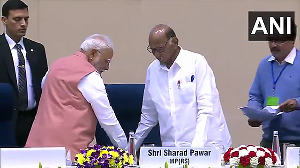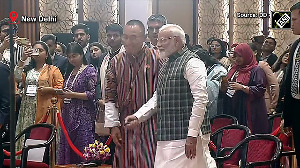David Plouffe, campaign manager of Obama for America, in his just released book The Audacity to Win: The Inside Story and Lessons of Barack Obama's Historic Victory, has referred to 'Punjabgate' which led to Obama's first exclusive interview with a South Asian news agency when he told rediff.comthat he was extremely sorry and pained by the faux pas and that it was not meant to hurt India and the Indian-American community.
In that interview, Obama in pleading not guilty, said he had nothing to do with the controversial document his campaign had circulated that disparagingly described his then president rival Hillary Clinton's Indian links. It was this interview where Obama in setting the record straight put the controversy effectively to rest and placated the large segments of the Indian American community--particularly the majority among the young Indian American Democrats--who had been deeply hurt by this perceived stereotyping.
Plouffe, considered not just the architect of the campaign that put Barack Obama in the White House, but also the catalyst behind the grassroots movement that changed the face of politics forever, in recounting the amazing story of how the Obama for America campaign developed and executed its sweeping, unprecedented plan, writes that since February 10, 2007, when Obama declared his candidacy for President in Springfield, Illinois, the campaign "had done a pretty good job of staying out of the deep much. Until Punjabgate."
He recalls that "our research team had put together a document that highlighted the voluminous examples of Hillary Clinton's expressing tacit support for outsourcing. We knew this could cause huge problems in Iowa with blue-collar voters, so we decided to send this background document around to select reporters in hopes of getting some stories written."
Plouffe, argued in his book that "this is standard operating procedurecampaigns move research and story ideas around to introduce them into the campaign dialogue without having to launch the attack themselves. Sharing such information is meant to spur a reporter into doing her own research and reporting; get it right and you can draft behind a press story and not catch the arrows for doing the dirty work."
Plouffe wrote about how "the document on outsourcing was titled 'Hillary Clinton, D-Punjab,' after an incident when Hillary Clinton was in India and she jokingly told a local official that should be a title because of her ongoing political interest in many things Indian."
Clinton had actually made this remark at a funddraiser hosted for her by Dr Rajwant Singh, the founder and chairman of the Sikh Council on Religion and Education, at his Potomac, Maryland, home. At this fundraiser, Clinton said, "I can certainly run for the Senate in Punjab and win easily," after being introduced by Singh as the Senator "not only from New York, but also Punjab" because of her close friendship with the Sikh community.
Plouffe, writes that "it was stupid and snarky; these research documents historically do not see the light of day, so communications staff doesn't treat them as though their language will be repeated. They are considered off-the-record and rarely get sourced. As a result, we were sloppy. But we got burned, and the New York Times broke the story that we were moving the D-Punjab document around the press world."
Plouffe recounts in his book that "as soon as we got the first call from the Times we knew we were in trouble. Our press secretary, Bill Burton, called me with the news as I was landing in Chicago, and my stomach sank. My first reaction was, 'How on earth could they write a story off a paper that was clearly research, a background document? But that was blame shifting and rationalization," he acknowledges.
"We had screwed up, and in a way that could be uniquely damaging. For other campaigns this would be a blip on the radar. But we had promised a different standard, and this was about as far as possible from the type of campaign we had pledged to run," Plouffe said.
Plouffe recalls that "Obama was predictably furious when I talked to him after getting off the phone with Burton(At the time, it was Burton who contacted India Abroad and arranged for the interview with Obama). Worse that that, he was disappointed. 'This is the first time I am embarrassed by my campaign,' he said. 'How could this happen? Is staff going renegade?'"
"'No, this was distributed to the senior message staff before it went to reporters,'I told him. None of us objected because it was a research document and we didn't expect that material to surface or be printed by the press.'"
Plouffe writes that an angry Obama had said, "'I never want this to happen again' making sure I had it clear. 'I want controls in place and I want you to take personal responsibility for it. I don't care what the other campaigns are doing. We can't use that as a standard. Get control of it or I won't allow us to send anything but our schedule out to the press.'"
According to Plouffe, "He was as short and upset as I had ever seen him. His campaign now looked jingoistic, simplistic, and engaged in the kind of politics he was running against. Poor Gibbs was traveling with Obama and said Punjabgate put Barack Obama in the foulest mood he'd seen him in three years. And much of it was directed at Gibbs, who was part of the command chain that was responsible for things like this and also happened to be in front on him all day long. Obama kept coming back to it. Gibbs took a lot of hear, but this one was my screwup. I should have killed the memo. I did a call with prominent Indian American activists around the country, who appropriately let me have it."
Plouffe writes that "we changed course after this incident and sent out very few research documents; when we did, they were straightforward and fact-based."He also said that "we set up internal controls so nothing got sent out without the right groups of us paying close attention and giving it a go-ahead. We had to control our message and make sure it was consistent, but we needed to pay even more attention to the tone of everything we were doing. This meant avoiding snark while still pointing out differences without abandoning decency."
In his exclusive interview with rediff.com, Obama said that the document had disappointed and hurt many, including his Indian American supporters.
"The concerns," he acknowledged, "are entirely justified," but pointed out that it was "not a memo that reflected my views or my attitudes, and didn't reflect my long-standing friendship with the Indian American community."
Obama said, "I was furious when I heard about it(the document)," and promised that "we are taking corrective action to make sure that people understand how this could be potentially hurtful.I myself come from a multi-cultural background of promoting the most inclusive politics possible," he said.
A few weeks after the controversy, or 'Punjabgate' as Plouffe described it in his book which is flying off the bookshelves, Obama provided India Abroad with a lengthy and exclusive op-ed where he once again emphasized his commitment to US-India relations and heaped kudos on the Indian American community for its contributions to America and spoke of what an integral and indispensable component they were to the fabric of American society.






 © 2025
© 2025